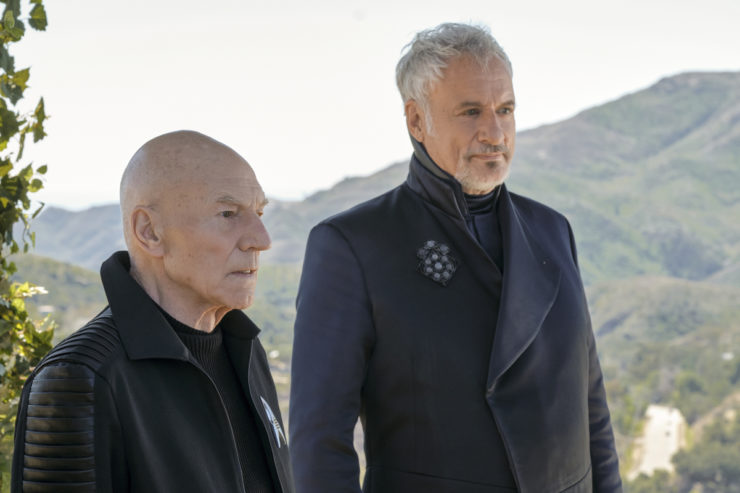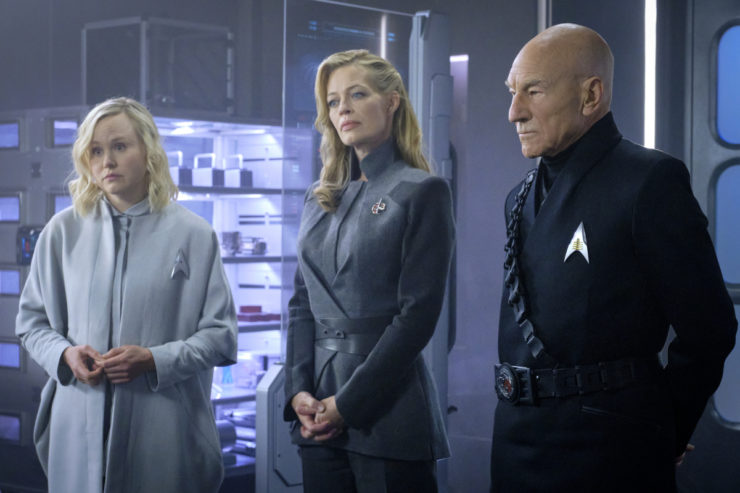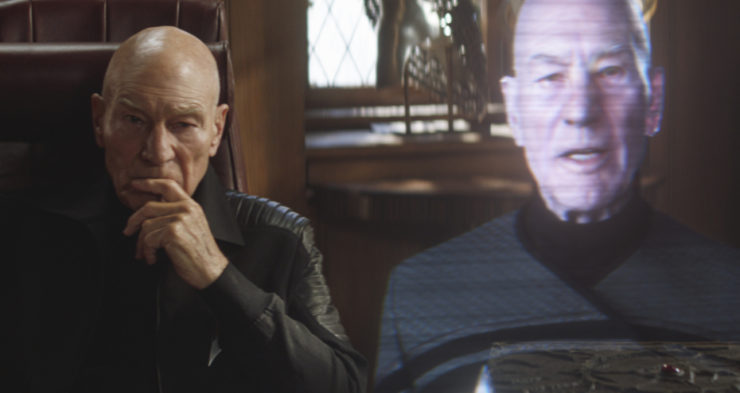Prior to this year, John deLancie had guest-starred as Q in a dozen episodes of Trek TV shows (plus a cameo in an episode of Lower Decks). One thing those twelve episodes made clear was that the character of Q was at his best when bantering with Sir Patrick Stewart’s Jean-Luc Picard. This was particularly evident in Q’s second appearance in TNG’s “Hide and Q,” where his scenes with Jonathan Frakes’ Riker could charitably be described as leaden, and in Q’s appearances on DS9 and on Voyager, which were missing a certain spark.
We got hints of that spark when Q appeared at the end of “The Star Gazer,” and it’s in full force for the teaser of “Penance,” and it’s glorious.
The double act of Stewart and deLancie as Picard and Q is sufficiently powerful that it even extended into the tie-in fiction. In comics and novels written by Greg Cox, Peter David, Michael Jan Friedman, Mike Johnson, your humble reviewer, and deLancie himself, the best scenes were always the ones where Picard and Q were teamed up.
And we get a glorious example of it at the top of “Penance.” Q being snotty and parsimonious with specifics as to what the hell is going on, Picard being ever-more frustrated with the entity’s obfuscation. Best of all, thanks to the looser language standards on a 2022 streaming service, as opposed to syndicated commercial television at the end of the previous century, Picard gets to say, “I am too old for your bullshit,” which, I gotta say, I’ve been waiting thirty-five years to hear.
What Q presents to Picard is a world that is horribly changed. As with the original series’ “The City on the Edge of Forever,” DS9’s “Past Tense,” and First Contact, history has been changed, and our heroes must go back in time to fix it.

We find the second part out later in the episode. The opening is where the meat is, as Q shows that General Jean-Luc Picard is the premier military commander of the Confederation, an Earth-based dictatorship that has conquered a great deal of the local space (and also which has badly damaged the planet, which needs a massive force field around the globe to periodically scrub out all the pollution). Q shows off General Picard’s trophy room of skulls of his enemies: Gul Dukat, General Martok, and Sarek of Vulcan, all executed by the general, though Dukat apparently did sufficient harm that this Picard also had to be transferred to an android body. (Why a fascist general would choose to transfer his body to one that would age and die as opposed to a younger one is left as an exercise for the viewer.) Sarek was beheaded on the steps of the Vulcan Science Institute in front of his wife and son, presumably Perrin and Spock…
Q says this is some form of penance, though for what is unclear. The discovery of what, exactly, he has to repent will, I’m sure, be the subject of the remaining eight episodes of this sophomore season, and probably relates to the relationship issues Picard couldn’t stop talking about last week. Q also says he’s providing help, and for no good story reason, that help consists of the people in the opening credits of Star Trek: Picard, who also remember their lives in the mainline timeline.
Let me be blunt, this makes absolutely no sense. Well, okay, not absolutely no sense. I can see Q bringing Musiker and Elnor along into this new reality, since they’ve both been close to Picard for years. But Rios is the guy he hired for one specific mission, and Jurati and Seven were people tagging along on that one mission. Why the three of them and not Riker, Troi, Crusher, Worf, or La Forge?
Of course, we know why: they’re not in the opening credits of Star Trek: Picard. But it comes across as manipulative and the laziest of lazy writing, letting who’s starring on the show dictate plot rather than good sense.

Once Q disappears right before the credits roll, we get all of our main characters “waking up” in this new reality. Seven is now President Annika Hansen, the head of the Confederation, whose husband is the magistrate (played by Jon Jon Briones, the father of Isa, who played Soji and Dahj). Jurati is a scientist working for the Confederation, Musiker is the head of security for Earth, Elnor is a Romulan dissident, and Rios is still the captain of La Sirena, but now it’s a warship for the Confederation on the Vulcan front.
Having Seven be the president and Picard a respected general makes it pretty easy for our heroes to contrive to get themselves together, though this also means we’ve done two episodes in a row in which the band has to be gotten back together. Which is not the only bit of repetition here, as we also have the must-adjust-to-an-unexpected-unfamiliar-landscape trope, seen not only in the three aforementioned time-travel storylines, but also in “Mirror, Mirror,” “Assignment: Earth,” The Voyage Home, “Time’s Arrow,” “Future’s End,” “Workforce,” “Despite Yourself,” etc., etc., etc. It’s mildly entertaining to see how each person responds—Seven and Musiker adjust perfectly, while Rios and Jurati struggle a great deal. (Elnor mostly just looks confused. But he does get to kick butt at one point, so that’s fun.) But it’s also a major letdown, to have to go through this all over again, particularly after the spark and wit of the Q-Picard conversations at the top of the episode.
If that’s not all perfunctory enough, we also get the Borg Queen. Apparently, Alice Krige is willing to voice an animated hologram of the Borg Queen (in Lower Decks‘ “I, Excretus“), but is not, at age 67, willing to subject herself to the Borg Queen makeup. And who can blame her, really? Instead, Annie Wersching takes over the role, and unlike last week’s Borg Queen, this one looks like the one that was previously played by Krige and Susanna Thompson.
Buy the Book


Until the Last of Me
The scenes where Picard and Seven each confront her are beautifully played by Stewart and Jeri Ryan, with the anger and trauma both associate with her etched on each actor’s pores and choked through their vocal performances opposite the queen.
The queen announces that the schism in time that led to this awful present occurred in Los Angeles in 2024, and once again I’m rolling my eyes. Yes, it’s yet another startling coinky-dink that our heroes have to go to the era in which their TV show or movie is filmed! (“Tomorrow is Yesterday,” “Assignment: Earth,” The Voyage Home, “Future’s End.”) Secret Hideout actually seems to have a budget for their shows (as witnessed, not just by the special effects we’ve seen on Discovery and Picard, but also the music they’ve shelled out to get the rights to), so to learn that their destination is, basically, present-day L.A. where and when the show is filmed is disheartening.
Bits of this episode are fantastic. I love that Musiker has no trouble getting into character as Chief Raffi Musiker. Jeff Russo does a superlative job with the music, as every scene involving the Confederation has a score that is both bombastic and stentorian. Director Doug Aarniokoski does a nice job of arranging the shots when we first see Seven so we don’t see the left side of her face or her hands until she looks in a mirror and the Borg implants aren’t there. Patton Oswalt is a delight as the voice of Jurati’s AI cat. I squeed a bit at the mention of General Sisko. And, of course, every nanosecond that Stewart and deLancie are bantering is perfection itself.
But so much more of the episode doesn’t work. Jurati’s babbling was entertaining last week, but this week you wonder why the magistrate doesn’t just shoot her. Her deciding to bitch to Rios about their relationship issues in the middle of a crisis is absurd—indeed, Rios calls her on it, and one wishes he’d done the same to the four people credited with writing this episode—and her attempts to cover herself make Kirk’s ridiculous mechanical rice-picker bit in “City on the Edge” look brilliant by comparison. Rios doesn’t really get to do much except be confused and provide a ship. The writers continue to struggle to come up with things for Elnor to even do, and I gotta say at this point I have no idea what purpose he serves on the show at all. And the Eradication Day scene, in which Picard is to execute the Borg Queen, goes on about six ice ages too long, thus giving us two episodes in a row in which the climactic action scene is drawn out to the point of ridiculousness.
The writing staff is determined to end each week with a nasty cliffhanger, at least: last week it was Q bringing Picard to a weird alternate reality, and this time it’s the magistrate capturing our heroes before they can take La Sirena back in time.
Neither Isa Briones nor Orla Brady are in this episode, after being in the opening credits last week, which is extremely disappointing. Soji isn’t even mentioned, and Picard is informed that Laris (along with Zhaban) died at the gates of Romulus, fighting against the Confederation.
We’ve had two straight episodes with the exact same plot structure, and if our heroes go back in time, we’ll get to do a lot of it again. With only ten episodes, I’m not sure the season can really bear this level of repetition.
As usual, the episode is still eminently watchable, mainly due to the superlative talents of Stewart and Ryan, as well as deLancie. Picard’s frustration at Q, his determination to figure out what’s going on, his disgust at being face to face with the Borg Queen again, and his rather impressive impersonation of a fascist asshole when called upon to be so is all magnificently played by Stewart.
We’ll see what happens next week. (Which is what I said last week. The repetition is just everywhere…)
Keith R.A. DeCandido wrote Q in his 2007 Next Generation novel Q & A, which was more fun than you can imagine.










